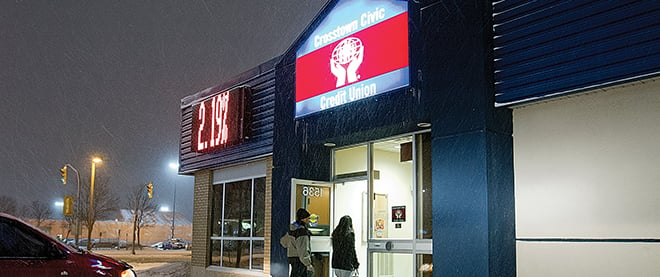Manitoba shakes its money maker
Manitoba credit unions are beating out Bay Street banks as the best places to park cash
Photograph by Marianne Helm
Share

It may seem like a contradiction, but these days, a high-interest savings account at one of Canada’s big five banks, where base rates are just over one per cent, often doesn’t even keep pace with inflation. And as the industry continues to consolidate—with the Royal Bank of Canada’s recent $1.4-billion purchase of Ally Financial (and the subsequent winding down of Ally’s 1.8 per cent high-interest savings accounts) being the latest example—the alternatives for savers are rapidly becoming fewer and further between.
Unless, that is, you’ve been stuffing your money into Manitoba. Several of the province’s credit unions boast online divisions that still offer attractive two per cent interest rates on their high-interest and tax-free savings accounts. They also sport catchy names like AcceleRate (Winnipeg’s Crosstown Civic Credit Union), Achieva (Winnipeg’s Cambrian Credit Union) and MAXA (Brandon’s Westoba Credit Union). Another, called Hubert, was launched two years ago by Sunova Credit Union of Selkirk. It features a smiley-face logo and promises “happy savings.”
John Hamilton, a spokesman for Credit Union Central of Manitoba, the provincial industry’s trade association, says the RBC purchase of Ally is already being felt by members—many of which take deposits from non-Manitoba residents. “The virtual credit unions have said they’re getting more calls and emails from out of province,” he says.
Manitoba’s emergence as a hotbed of online finance has been years in the making. Cambrian’s Achieva Financial was one of the country’s first online-only financial institutions when it first went live in 1998. The low-cost formula was subsequently copied by competitors and has helped boost the popularity of Manitoba credit unions, with total assets growing by double digits almost every year since 1999 to $21.3 billion today.
The industry’s rise hasn’t been without controversy, however. Back in 2010, Sunova found itself in hot water with Canada’s banking regulator for using the word “bank” in its Hubert promotional material. It also got in trouble with regulatory bodies in other provinces for marketing its new online outfit beyond Manitoba’s borders. Member-owned credit unions are regulated provincially and aren’t allowed to solicit funds from other provinces, although there’s nothing to stop them from accepting deposits from out-of-province residents who discover their services online. This could be about to change following new rules from Ottawa that will allow some credit unions to operate nationally, competing head-to-head with banks.
As for what’s driving Manitoba’s high rates, Hamilton says it’s a combination of efficient operations and demand for loans: “We’ve always had a really strong, steady economy—even through the recent recession.” However, Laurence Booth, a professor at the University of Toronto’s Rotman School of Management, says high rates can also be used to fund expansion or grab market share (as was the case with ING when it launched in Canada in 1997), which can entail more risk for deposit holders: “Given the ‘hunger for yield,’ offering another 0.5 per cent could attract large deposits from people who don’t pay that much attention to the institution, particularly if they go through a broker,” Booth says.
The Manitoba industry, however, stresses that its credit unions are well run and well capitalized. Plus, the Deposit Guarantee Corp. of Manitoba (DGCM), which holds about $208 million in its fund, provides unlimited guarantees on all credit union deposits in the province. That’s in contrast to the federal Canada Deposit Insurance Corp., which only covers bank deposits up to a limit of $100,000 per account. And while some have suggested the DGCM doesn’t enjoy the same implicit government backing of the CDIC, a Crown corporation, Vernon MacNeill, the Manitoba insurer’s CEO, points out the province wrote the DGCM’s governing legislation and therefore could likely be called upon in a crisis.
But what will happen to those high rates if money continues to pour into Manitoba from elsewhere in Canada? Credit unions generally make money off deposits when another member borrows it at a higher rate. “When I read about what RBC is doing with Ally, I knew there was going to be more interest in Manitoba,” MacNeill says. “Now each credit union is going to have to make its decision whether to take that money, because you have to be able to lend it back out.”